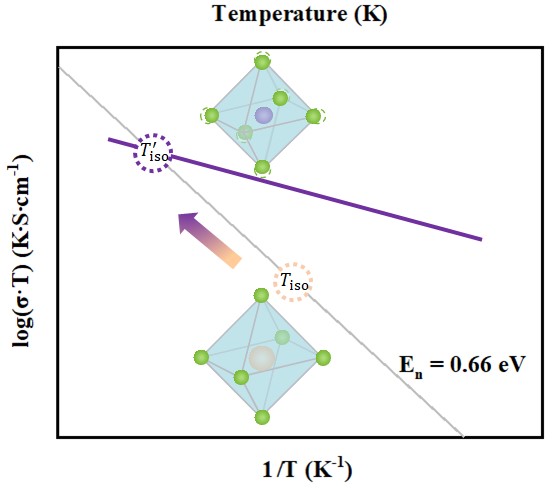The University of Michigan – Shanghai Jiao Tong University Joint Institute (UM–SJTU JI, JI hereafter) Professor Qianli Chen and her collaborators have published a research article “Optimizing the Proton Conductivity with the Isokinetic Temperature in Perovskite-Type Proton Conductors According to Meyer–Neldel Rule” (weblink) in Advanced Energy Materials, a top journal in energy-related research.
The article suggested that the enhancement of proton conductivity at low temperatures can be achieved by tuning lattice vibration frequency toward a desired isokinetic temperature. Corresponding authors of the paper are Professor Qianli Chen and Professor Wenge Yang from Center for High Pressure Science & Technology Advanced Research (HPSTAR). JI graduate student Peng Du is the first author. Dr. Nana Li from HPSTAR, JI graduate student Zhijun Fan, Dr. Artur Braun from Empa – Swiss Federal Laboratories for Materials Science and Technology, and Professor Arthur Yelon from the Polytechnique Montréal, Canada participated in the research.

Solid oxide fuel cells are electrochemical devices that directly converts fuels (e.g. hydrogen, natural gas) from chemical energy into electricity, with advantages of high energy conversion efficiency, cleanliness and environmental friendliness. However, the current working temperature of solid oxide fuel cells is generally high (700-1000°C), imposing strict requirements on the high-temperature durability of all component materials for the device. Proton conducting ceramics are used as fuel cell electrolyte material, the operating temperature can be reduced to 450-700°C, thus significantly reduce the production cost. However, their proton conductivity needs to be further improved for the commercilization of fuel cells. By revealing the relationship between lattice vibration and proton conductivity, the authors suggest a design princile for new perovskite materials with high proton conductivity.
Diffusion of protons need to overcome an energy barrier, called activation energy. In general, to increase the proton conductivity, the activation energy is expected to be reduced. The authors found that the proton conductivity follows the Meyer-Neldel rule, which is a compensation principle. When the activation energy decreases, the pre-factor in the conductivity equation decrease correspondingly, thus supressing the enhancement of conductivity. The authors discovered that when tuning the activation energy by changing the material structure, the conductivities with different activation energies intersect at an isokinetic temperature, where the proton conductivity is independent of activation energy, but only depends on the intrinsic properties of the material. From the relationship between isokinetic temperature and material structure, the authors proposed that enhancement of proton conductivity at low temperatures can be well achieved by modulating material structure toward a desired isokinetic temperature. The new material design principle proposed in this paper will benifit the development of new ceramic proton conductors with higher proton conductivity, and promote the application of protonic devices.
Personal Profile

Qianli Chen is currently a tenure-track associate professor at the UM-SJTU Joint Institute. She received her bachelor degree from Southeast University in 2007, master degree from KTH Royal Institute of Technology in 2009, and doctorate degree from ETH Zurich in 2012. After postdoctoral research at Max Planck Institute for Polymer Research from 2013 to 2015, she joined the UM-SJTU Joint Institute. Qianli Chen’s research focuses on the proton conductivity in ceramics, in-situ spectroscopic methods for nanoscale material chemistry and physics, and charge carrier transport in optoelectronic materials and devices. The new knowledge paves the way for the rational design of novel materials for cost-effictive devices





